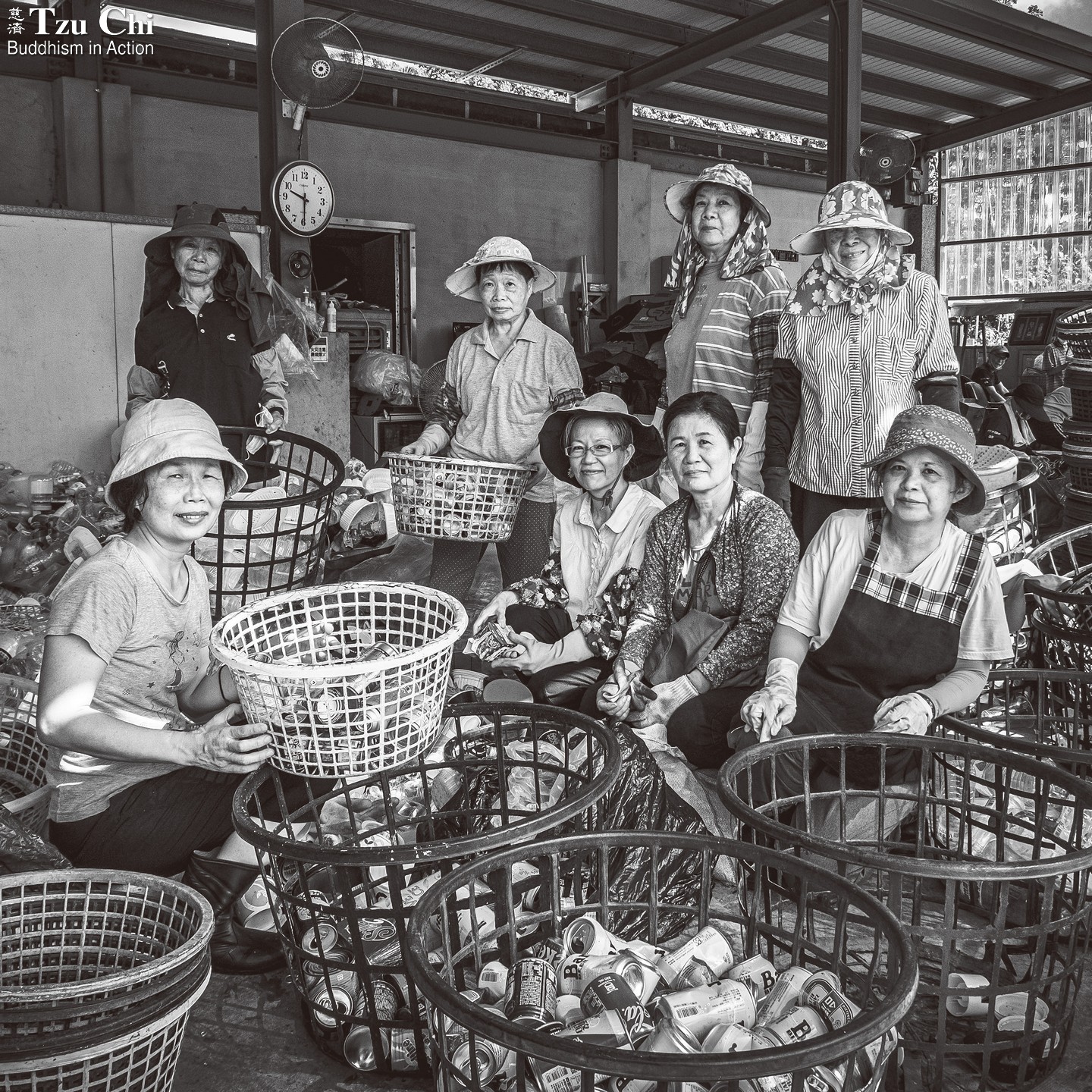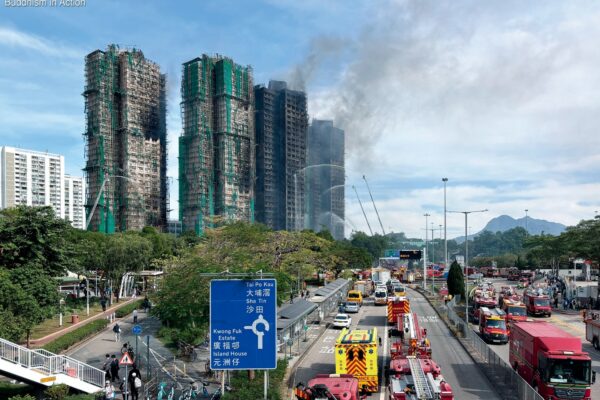Text and photos by Huang Xiao-zhe
Translated by Wu Hsiao-ting

Volunteers at the Zhushan Recycling Station pose for a photo. From left: Yang Feng-ling (楊鳳玲), Zhang Yue-zhu (張月珠), Huang Lin Mei-yue (黃林美月), Ye Pin-xiu (葉品秀), Huang Jin-man (黃錦滿), Cai Xiu-zhi (蔡秀治), Qiu Luan-ying (邱鑾英), and Cai Wan-zhen (蔡宛真).
Zhushan Township, nestled in Nantou County, central Taiwan, translates to “bamboo mountain” and is celebrated for its abundant bamboo production. With ideal geography and climate, the area yields various varieties of this plant year-round, making its bamboo products well-known far and wide.
On my first visit to the Zhushan Recycling Station, I immediately felt the warmth of the local people and their deep connection to the land. Over the years, more and more locals joined Tzu Chi’s recycling efforts, and numerous recycling points sprang up as a result. However, many changed locations or had to close entirely as circumstances changed. Thankfully, in 2021, a more permanent site—the Zhushan Recycling Station—was established next to the Zhushan Jing Si Hall, providing a stable, central hub for volunteers’ efforts.
Volunteers gather at the recycling station every Wednesday and Saturday, the designated recycling days. Some drive trucks to collect recyclables, others sort materials, and still others prepare snacks and lunch for the team. This group of like-minded people has developed a strong sense of teamwork, each contributing in their own way to a shared mission.
As I took a group photo that day, I imagined each volunteer as a unique bamboo shoot emerging from the soil—each deeply rooted in their commitment to resource recycling and environmental protection. They embody a vibrant spirit, both filling their lives with purpose and nurturing the Earth’s vitality.
Zhushan’s Unique Handcarts
When I entered the recycling station, I was drawn to a handcart used for transporting recyclables. At first glance, it resembled a mini “Transformer”! On closer inspection, I noticed that the cart’s four wheels and the round aluminum rings on its sides had been salvaged from old wheelchairs and bicycles. An aluminum screen window served as its base, while the rest of the frame was assembled from various recycled metal parts. This inventive design redefined my idea of a handcart—it was both creative and an impressive example of resourceful repurposing.
A volunteer later explained that all the handcarts at the station were designed and assembled by Zhang Wei-gao (張維誥), a former craft teacher at Zhushan Junior High School. Dubbed the “Zhushan MacGyver,” Zhang has a unique talent for turning discarded items into practical, functional objects. While many would see broken tools or electronics as waste, he repairs and repurposes them using almost entirely recycled parts. As he put it, “To me, repairing something to extend its life is far better than letting it turn into tomorrow’s waste.” In his view, objects and people hold equal value; when things are treated with care, we begin to see love and gratitude reflected in them.
Steadfast in Their Efforts
It was not yet eight in the morning when Shi Tian-sheng (石添勝) arrived at the recycling station with his 91-year-old mother. A former aviation safety officer, Shi had returned to his hometown after retiring to care for her. What began as an act of filial duty soon evolved into a lifelong commitment to environmental work, a dedication he has maintained for over 20 years. With few volunteers available to drive trucks, Shi took on the responsibility of collecting recyclables along various routes at least six days a week. His mother works in the sorting area at the station, cutting paper and organizing items.
It was already noon by the time Shi returned with a full load of recyclables that day. Despite the heat and his perspiration-soaked clothes, his face showed no trace of fatigue. Another small truck pulled into the station just then. As volunteers helped unload it, a petite woman in a floral-patterned hat stepped out of the driver’s seat. Her name, I learned, is Chen Qia (陳洽). Now 71, she has devoted over 20 years to recycling work. Energetic and determined, she tackles every task with enthusiasm, undeterred even by the demands of driving a manual truck. Years of lifting and physical labor have left her with some aches and old injuries, but she takes them all in stride, saying, “Being able to move and work is a blessing!”
The “Flavor” of the Zhushan Recycling Station
Under the canopy in one corner of the Zhushan Recycling Station, three culinary volunteers of similar age were busy at work preparing lunch for more than 20 recycling volunteers. Despite the outdoor setting, they had all the necessary equipment for cooking. The trio had, over the years, developed a smooth and efficient routine, with Zeng Bi (曾碧) and the petite Lan Cai-hua (藍彩華) preparing the ingredients and Shi Su-qin (石素琴) in charge of cooking. The three of them always work together on recycling days. They begin meal preparations at 8 a.m., and although there are only three of them, their dishes are far from basic. In less than three hours, they manage to prepare eight different vegetarian dishes, each one delicious and visually appealing.
As noon approached that day, the recycling volunteers wrapped up their work and gathered to enjoy the meal. I had the pleasure of dining with them. Though the midday heat surrounded us, we sat on recycled plastic chairs, savoring the meal with great satisfaction. A volunteer even shared a dish made with bamboo shoots she had grown herself. Every face reflected contentment, and I couldn’t help but feel moved. This, I realized, is the “flavor” of the Zhushan Recycling Station—simple yet fulfilling and truly blessed.



